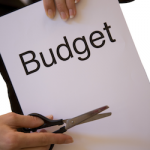As someone with a bunch of regular expenses, I know that they add up. I also know that you’d have to pry my laptop from my cold, dead fingers before I’d voluntarily give up the internet. In my husband’s case, cable is a necessity. How do you choose between one recurring expense and another? Prioritize.
[Read more…] about Recurring Expenses Will Kill Your Budget-Choose Wisely
Goals
Do You Have What It Takes To Manage Your Money?
Do you have goals, dreams, and ambitions? Chances are you do, which brings me to my next question. Do you have a budget? If you don’t have a budget then the chances of you reaching those goals, dreams, and ambitions are smaller than if you had a financial road map to follow. Unfortunately, too many people attach negative connotations and misconceptions to what budgeting actually means for you.
[Read more…] about Do You Have What It Takes To Manage Your Money?
Savings Goals In The New Year And Beyond
Making just one goal with regards to your savings can make a real difference. Here are savings goals which can help you have a financially secure and less financially stressful 2010, so know your situation and choose one which best suits you.
[Read more…] about Savings Goals In The New Year And Beyond
Are Your New Year’s Resolutions SMART?
Kudos to you if you are still keeping up with your New Year’s resolutions! But most people who make New Year’s resolutions aren’t keeping them by month’s end.
Why? They weren’t SMART!
What are SMART goals?
S – Specific
M – Measurable
A – Attainable
R – Realistic
T – Time-Bound
Specific – Your goals should be as detailed and specific as possible. It’s not enough to say you have a goal of saving lots of money. You need to give it a figure like “I will save $3000 this year.” Without specifics you are just floating out there. If you only say your goal is to save then did you achieve your goal by putting fifty cents in a jar? Didn’t accomplish much with that.
Measurable – To continue with the savings example, how will you get that $3000? In one lump sum? Or perhaps in measurable terms like “I will save $250 a month. This will be $125 from each of my pay periods in the monthly.” Being able to measure your progress will help you move along in your goal.
Attainable – Can you achieve this goal? Will you be able to break it up into smaller achievements that will add up to the goal? In our example we save $125 per paycheck in order to attain the big goal of $ 3000 in savings for the year.
Realistic – Do you believe your goal can be reached? For our example you have to be able to save $250 a month. If you currently only save about $50 a month then you either have to figure out a way to squeeze out more savings or you might need to make your goal more realistic. When a goal is unrealistic you’ll become frustrated before long and give up the goal.
Time-Bound – Give yourself a pre-determined time frame for your goal. Back to out example – It’s great to want to save $3000 but it’s very different to do that in year and to do it in ten years.
The SMART system is a great guideline for you to set goals with. Ask yourself if your New Year’s resolutions are SMART. If they are you have a much better chance of accomplishing them!
Sign up with ING Direct and get a $25 bonus
![]() photo credit: Laineys Repertoire
photo credit: Laineys Repertoire
Goals Are Great Motivators
Goals can be great motivators to help you achieve! I find that when I have a specific goal it’s much easier to focus on what I want to accomplish. For example: For me to save money is one thing but when I have something specific to save for I find that I can save up much quicker. When I was younger I wanted a new stereo (the hand-me-down I was given still had an 8-track in it). I made a goal of saving up for a new stereo. When I sacrificed some expense for savings I knew i was to help me get that stereo. When I worked extra hours in the supermarket I knew it was for the stereo. In no time I had enough to go out and buy a new stereo, equipped with not one but two tape decks! (Have I dated myself or what?)
Let me give you some other goals I’ve set for myself and accomplished:
Ran the NYC Marathon – In 2005 I decided I wanted to run the NYC Marathon. I knew I needed time to train and run enough races (you have to run 9 NYC RoadRunner races for guaranteed entree). In 2006 I mapped out what races I would run to qualify for the next year’s race. It was tough to keep up but I ran and finished all nine races for entry. In 2007 I started a training program to get me in shape for the marathon. In June I started my longs runs every weekend to get me ready for the distance. The first Sunday last November I woke up at the crack of dawn and hopped on the Staten Island ferry to get to the start of the marathon. Later that afternoon I would be able to call myself a marathon runner. I don’t think I ever would have run the distance without a specific goal of running the marathon.
Paid off my credit cards – Some years ago I finally got fed up with how much I was paying monthly in interest for my credit cards. I resolved to pay them off. It started slowly but bit by bit I started to gain ground. After an incident that led me to move back with the ‘rents I was able to turbo charge my payments and finish off my credit card debt. I haven’t had more than a month’s charges since then (I pay my cards off in full every month). Without resolving to pay off my credit cards once and for all I would still be idling along with minimum payments and a ton of debt piling up.
Started a personal finance blog/site – In October of 2007 I had discovered blogging via Zen Habits then Get Rich Slowly. I was already itching to find something productive to do with my time and had healthy interest in personal finance. I set a goal of starting up my own blog and making it successful. I’m still in the middle of this goal but I feel like what I’ve done so far has been a success, especially when I look back at my first month of original posts on my Blogger site. Without my goal I might be surfing fantasy baseball sites instead of writing this article.
Build up our savings – My wife and I wanted to make sure we had enough in savings for any emergency and then some. Rather than hope to put some money away with what was left over at the end of every month we calculated a specific amount we could afford to do without and set up our ING savings to automatically withdraw money from our checking every week. We have since achieved our emergency savings goal and exceeded it. If we didn’t create a specific plan our savings would be considerably less and we’d be scratching our heads wondering where our money went.
The lesson here is that I was motivated to accomplish different things because I set a goal to achieve! Having a goal in mind keeps my mind focused. Without a goal set I would have just floated along in many cases. My savings would be lower, my credit card debt still existing, my running much less, this site just a thought…
One way to accomplish a goal is to make it SMART – Specific, Measurable, Attainable, Realistic, and Timely. (Thanks to Cash Money Life for turning me onto that concept.)
I also like to think in terms of short and long term goals. For example – The goal of saving up for a down payment on a home, while an admirable goal, may seem a bit too big to ever accomplish. That could be a long-term goal. To make it more achievable you can create a short-term goal of saving X dollars a month towards a down payment. This way you see your small goals achieved which helps build up the confidence to achieve your bigger goal.
Check out this article on the science of setting goals. When you set a goal you are actively engaging your brain to help you with your goal!
What goals have you accomplished? What are your current goals and how will you achieve them?
Sign up with ING Direct and get a $25 bonus – Free From Broke.
photo credit: Martineric




